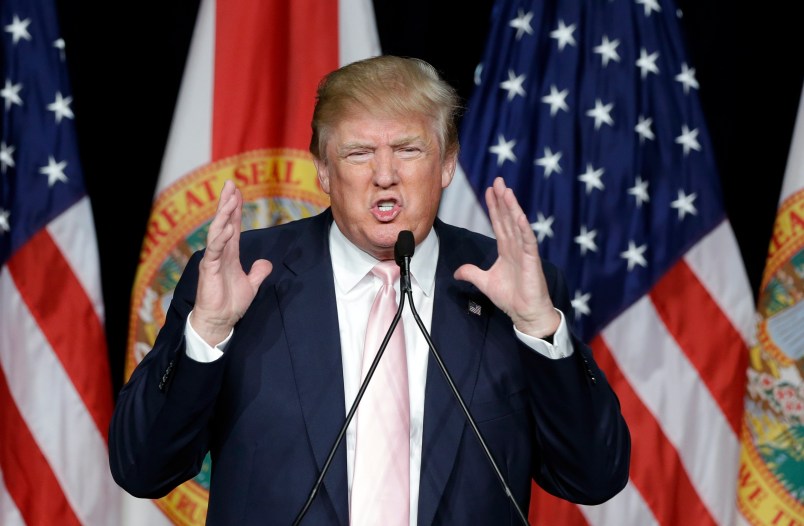We’ve already seen how, in the first weeks of Donald Trump’s candidacy, he not only pushed immigration higher on the GOP primary issue list but managed to mainstream a choice of language and policies which had heretofore been the preserve of folks like Louie Gohmert in the House of Representatives. We’re now seeing a similar pattern on what we might call the immigration-terror paranoia nexus, where Trump first publicly considers an outrageous idea, rapidly endorses it and then is followed to varying degrees by other candidates. I think this is actually very important. So allow me to explain.
Over the course of just a few days Donald Trump has gone from saying that we might have to close down mosques and create a Muslim registry to saying that not only will we do this but we have to do it and anything less is an utter capitulation. In other words, rapidly evolving from refusing to rule out a draconian policy to affirmatively endorsing it to being its leading advocate. Some of this seems rooted in Trump’s personality and improvisational campaign style. Sometimes a reporter prompts the discussion and Trump refuses to rule it out. But once he’s floated an idea as a potential part of his no nonsense, no excuses agenda, it’s never long before the momentum of his self-assertion brings him to say he’ll definitely do it and to dare anyone else to outdo him on it.
So on Monday he’s saying he’d “strongly consider” shutting down mosques. And then just a day later he’s saying he’d “absolutely” close them down. With his Muslim ID card and database, Wednesday he said he wouldn’t rule out creating such a system. By the end of the day he was telling NBC News he would “absolutely” create such a system.
As I said, some of this almost cookie-cutter progression is in the nature of Trumpism. Once he christens an idea as a tool of presidential badassery, it’s only a matter of days until he comes out and says that he’s ‘absolutely’ going to do it.
But just as we saw in the summer with immigration writ large, the progression doesn’t end with Trump. We’ve had three presidential elections since the 9/11 terror attacks and no presidential candidate has ever proposed shutting down mosques in the United States or creating a special registry and identification cards for Muslims living in the United States. So yesterday Megyn Kelly asked Marco Rubio whether he’d shut down radical mosques like Trump. He tried to deflect the question by saying that it wasn’t about mosques but closing down any facility that was promoting radicalism. In other words, Rubio, while clearly not eager to answer the question, pointedly refused to rule out following Trump’s lead.
It is a very good example of how Trump is not only shaping the debate on the right but rapidly mainstreaming ideas that were as recently as a week ago considered entirely outside the realm of mainstream political discourse. It’s particularly effective with the less sophisticated and principled candidates like Rubio. Jeb Bush said flatly this morning that Trump’s database proposal is “just wrong.” But Ben Carson quickly took Trump’s lead comparing Syrian refugees to “mad dogs.” The difference is that Marco Rubio could very well be president in 18 months. Jeb Bush won’t be.
The pattern with Trump is genuinely fascinating to observe, and so predictable as almost to be comical. But this is no longer a matter of Trump yakking on about building a gilded 100-foot wall along the southern border and having Mexico agree to pay for it. Trump is now proposing things that sound like they put millions of American citizens and resident aliens on a road to something like the internment of Japanese Americans during World War II.









